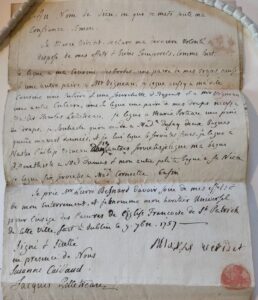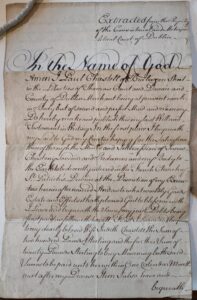
Wills and Dublin’s Huguenot community in Marsh’s Library
Recent Maddock Fellow Emily Vine shares some of her research into the wills made by members of Dublin’s Huguenot community

Maddock Fellow, Emily Vine
Wills are one of the most important sources that we have for the lives of ordinary people in the past. They provide information about where and when people lived and died, their occupation, marital status, details of their relationship to named friends, family, employees or acquaintances, hints at individuals’ religious beliefs, and insights into their personal wealth, property ownership, possession of household furniture and other ‘moveable’ belongings. Indeed, for the early modern English context, wills are the only type of personal document to survive in their hundreds of thousands for the period before 1800. The project that I currently work on, ‘The Material Culture of Wills, England 1540-1790’, analyses thousands of wills to get an insight into the sorts of objects that people owned and left as bequests to friends and family. For early modern Ireland, we unfortunately do not have this same number of surviving wills, due to the destruction of the Public Record Office in 1922.

Marie Viridet’s will
Where early modern Irish wills do survive, it is largely because they had been copied or stored away from the Public Record Office. Marsh’s Library is fortunate to hold a small number of seventeenth- and eighteenth-century wills, mostly for members of Dublin’s Huguenot community. They appear to have been stored separately, perhaps by a solicitor, because they relate to property owned by Dublin Huguenots or contain bequests to the Société charitable des François refugiés à Dublin – a charity set up to support destitute Huguenots, and now known as the French Huguenot Fund.
While at Marsh’s Library I was lucky enough to view examples of these original wills, many of which make explicit mention of or leave bequests to the Huguenot community. The 1757 will of Marie Viridet leaves a bequest to ‘des Pauvres de l’Eglise Francoise de St Patrick de Cette Ville’ (The poor of the French Church of St Patrick of this City).

Paul Chastell’s will
The French Church was Dublin’s first Huguenot church, housed in the Lady Chapel in St Patrick’s Cathedral. In 1744 Paul Chastell, a Dublin merchant, left two houses on Brabazon Street to his son John, but with a contingency clause: if John died without children, the houses would go ‘to the Minister and Church Wardens for the Time being of the French Church of Saint Patrick’s Dublin’. These houses were bequeathed with the understanding that they would use the rents and profits ‘for the use Support and benefit of the poor men and Women of the said Church for ever’.
We can assume that John Chastell did indeed die without children, because the Brabazon Street houses were left to French Church. In Marsh’s Library there survives a whole bundle of papers pertaining to the administration of this bequest – the ownership of the Brabazon Street houses, their rents, and the people connected to them. This bequest explains why a copy of Chastell’s will was made and kept by the French Huguenot Fund, and stored away from the Public Record Office. As well as Chastell’s vision that the funds from the bequest be used by future generations, an unintended consequence has been the unlikely survival of his will, and a range of other related and significant eighteenth-century documents.






